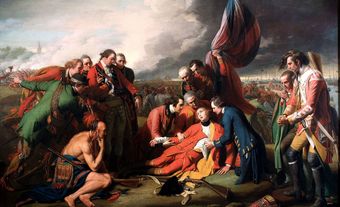
The Napoleonic Wars (1799-1815) were a series of wars between France and shifting alliances between other European powers. For a brief time, they made France the most influential power in Europe, as the conflicts cemented many of the fundamental changes emerging from the French Revolution not only in France but also in adjacent lands in Germany, Italy and the Netherlands. The social, political, and legal impacts spread even further in Europe and Spanish America.
Napoleon Bonaparte
Napoleon Bonaparte was born in Corsica in 1769 and was trained in France as an engineer and artilleryman. In the army he rose from the rank of second lieutenant in the artillery to general in command of the French army in Italy (1796-97) and in Egypt (1798-99). Returning to France, he helped seize power to become First Consul (there were 2 others). In 1804, he crowned himself Emperor of the French. War with Britain resumed in 1803, soon involving other European countries as well, and this struggle lasted until 1814. Napoleon abdicated in April and was exiled to Elba, but returned to France in February 1815. His reign and the Napoleonic Wars ended with his defeat at Waterloo 18 June 1815.
Napoleonic Wars in Europe
As a military leader Napoleon combined energy, imagination, and speed of movement to repeatedly defeat Austrian, Prussian and Russian armies. He forced the rulers of those countries and others to sign treaties recognizing his conquests and supporting his economic warfare against Britain. The British, while financing continental allies with subsidies, relied on their navy for protection against invasion and to wage war by seizing French overseas territories, blockading European ports controlled by Napoleon, and maintaining forces in the Iberian Peninsula (Portugal and Spain).
Napoleon showed his intention to dominate all Europe by creating puppet states, making his brothers kings in neighbouring countries with himself King of Italy. In 1807 he invaded Portugal (ally of Britain) and used his troops in Spain to force its king to abdicate so he could replace him with his brother Joseph. The result was a sudden and widespread uprising of the people against French occupation, which led to bitter guerrilla warfare that tied down thousands of French troops in the Iberian Peninsula. This Peninsular War had consequences throughout the wide overseas empires of Portugal and Spain.
For many years the British blockade cut off the Spanish-American colonies from their European master and made them dependent on English trade for European goods, which contributed to their successful struggle for independence. Faced with the mounting financial pressures of incessant warfare, in 1803 Napoleon sold to the US the Louisiana Territory, the entire western drainage basin of the Mississippi River, precluding a French West in that part of North America. The acquisition doubled the size of the US land mass, and in many areas displaced Native Americans or destroyed their way of life.
Britain gained mastery of the seas from Nelson's naval victory at Trafalgar 21 Oct 1805. In response to the Royal Navy's blockade, Napoleon's Berlin and Milan Decrees (1806-07) closed the ports of western Europe to British ships as well as to neutral ones if they had previously been to a British port, beginning what was called the Continental System. Britain responded with a series of orders-in-council (1807) that imposed severe restrictions on neutral vessels seeking to trade with continental ports. Many of the neutral ships were American and the result was increasing Anglo-American antagonism that led to the American declaration of war on Britain on 18 June 1812 (WAR OF 1812).
Effect of the Napoleonic Wars on Canada
The European wars greatly stimulated the export economy of the Canadas (Upper and Lower) and the Maritimes, for they provided a secure source of timber needed in enormous quantities by Britain's navy, the American Revolution having left the supply from the former Atlantic colonies uncertain and the Continental System having closed the Baltic. The result was development of the Canadian forest industry, especially in New Brunswick, accompanied by some growth of the trade in grain. The Canadian colonies also benefited from unstoppable smuggling during the war with the US, for Americans brought supplies across the border to sell and sought to buy British goods.
After Napoleon's exile to St Helena, a legend of his glorious reign and military genius became stamped upon this period of history. Portraits of him in uniform with right hand tucked into his vest, a portraiture convention of the time, are instantly recognizable.

 Share on Facebook
Share on Facebook Share on X
Share on X Share by Email
Share by Email Share on Google Classroom
Share on Google Classroom
